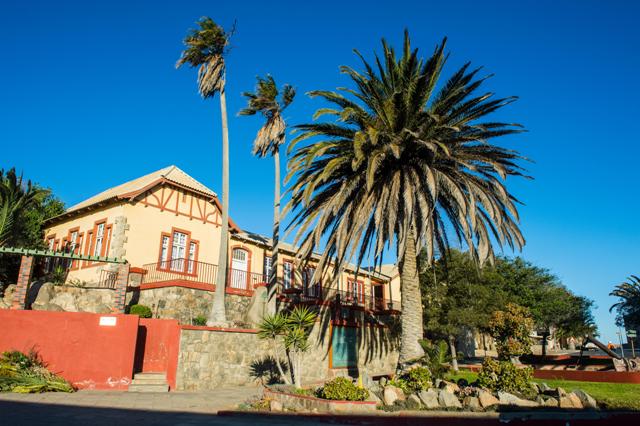 Old colonial German houses in Luderitz, Namibia. [photo: Alamy]
Old colonial German houses in Luderitz, Namibia. [photo: Alamy]
[This article is from The Round Table: The Commonwealth Journal of International Affairs. Opinions do not reflect the views of the editorial board.]
It has been a ‘blind spot’ in Western history that the German empire in the early 20th century ranked fourth in terms of the size of colonial territories. There remains ‘colonial amnesia’ in Germany. But German colonialism in South West Africa is alive in Namibia. Too visible are the reminders, including a privileged German-speaking minority. For the descendants of the Ovaherero and Nama, the Damara and San, the devastating and irreversible consequences of what they call the German-Namibian War between 1904 and 1908 remain a festering wound.
In a late but unique admission, in mid-2015 the German Foreign Ministry acknowledged that the colonial warfare resulted in genocide. Since then, special envoys engaged in bilateral negotiations to come to terms with this past. But major agencies of the descendants of the most affected groups were denied the participation they had expected. Their reference to the United Nations Declaration on the Rights of Indigenous Peoples had no effect. Adopted by the General Assembly in 2007 with the vote of both states, it entitles these to full participation in affairs affecting them. Without adequate representation, Ovaherero and Nama from Namibia and in the diaspora took the German government to a New York Court. The case was finally dismissed in early June 2021, only days after the special envoys concluded an agreement in Berlin after nine rounds of negotiations on 15 May.
While the German admission was a significant and internationally widely acknowledged first step by a former colonial power, it carefully avoided setting any precedent beyond the case. Genocide was accepted in moral and political but not legal terms. Reparations were categorically dismissed. As a ‘gesture of recognition’, Germany agreed to pay €1.05bn into a fund, which would allocate €35m annually over 30 years to development projects in seven of the 14 Namibian regions where most of the descendants of the victims are residents. But as Ian Khama, former President of Botswana pointed out, this excludes descendants in the diaspora, not least thousands living in neighbouring countries.
For many, this non-negotiable one-off sum adds insult to injury. German development cooperation in the 30 years since Namibia’s independence in 1990 added roughly the same amount. This contrasts with expenditure such as €1bn in 2020 alone for the purchase of COVID-19 protection masks of dubious quality, or €7-8bn for mega construction projects such as the Berlin airport and the Stuttgart underground railway station. Personnel expenditure for the 2021 annual budget of Berlin alone amounts to over €10bn.
As another slap in the face perceived as mere tokenism, another €50m has been allocated for a foundation to promote German-Namibian reconciliation, with civil society involvement, over the next 30 years. In contrast, the Berlin Holocaust Memorial alone amounted to construction costs of €28 m on a property worth €40 m. It also contrasts with €60 m put aside as annual maintenance costs for the Humboldt Forum in the Berlin castle (rebuilt at a cost of €700 m to bring back Germany’s imperial glory), which will also display cultural artefacts looted during colonial times.
While seeking to justify the agreement, Namibian Vice President Nangolo Mbumba and Prime Minister Saraa Kuugongelwa-Amadhila were clearly frustrated over the limited deal. A first debate in the National Assembly erupted in turmoil. The ratification of the agreement by the foreign ministers planned for June in Windhoek was postponed. The dramatic local rise of the COVID-19 pandemic added to the disruption of the schedule. Among the victims were the Ovaherero Paramount Chief Vekuii Rukoro and Gaob Afrikaner from the Nama as two of the most vocal and influential traditional leaders rejecting the agreement and also the special envoy Dr Zed Ngavirue, who too succumbed to the virus.
Once signed, the German President is supposed to ask for an apology in the Namibian Parliament. But the majority of the descendants are not represented there. Opposition parties have already warned that protest might disturb the solemn act. It clearly takes more to heal colonial wounds and promote reconciliation than the largely symbolic, piecemeal compromise agreed between the governments. As Germany’s special envoy Ruprecht Polenz has admitted since then, reconciliation cannot be claimed.
Henning Melber is the Senior Research Associate, Nordic-Africa Institute, Uppsala, Sweden.



